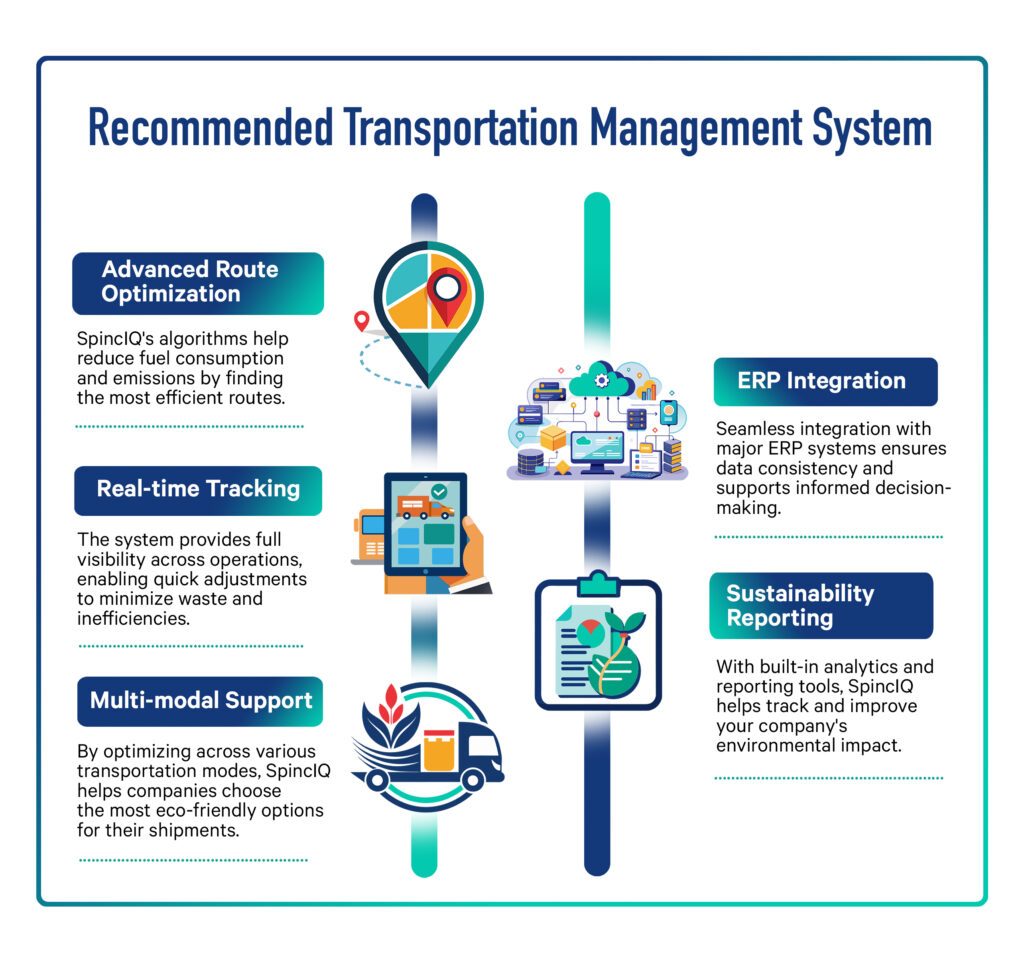October 23, 2024

The world is going green, and transportation needs to catch up. In Dubai, where the roads are busy and the air quality is a concern, making transportation eco-friendly is crucial. Recent data shows just how important this is:
A TMS, or Transportation Management System, is a smart computer program companies use to help make transportation greener. In fact, a TMS system has evolved from simple map tools to powerful programs that can improve the entire transportation process.
This blog explores how TMS is helping to mend big ills in ecologically friendly transportation-from finding the ideal routes to tracking how green a company’s transport is. In the end, TMS is going to be a must for any business that wants to be kinder to our planet.
The transportation sector plays a crucial role in global economic development, but it also significantly contributes to environmental challenges, particularly in terms of carbon emissions.
Recent data highlights the growing impact of transportation on global emissions:
The rapid growth in transportation emissions underscores the urgent need for sustainable solutions:
These statistics and initiatives necessitate innovative, sustainable solutions to logistics. The rapidly growing global transportation needs only increase the need to impose environment-friendly practices and technologies, making it almost an economic imperative by itself in the years to come.
Transportation Management Systems (TMS) offer powerful solutions to the sustainability challenges faced by the logistics industry. Let’s explore how TMS addresses some of the most pressing issues:
One of the biggest contributors to transportation emissions is inefficient route planning, leading to excessive fuel consumption. TMS tackles this problem through:
Advanced Route Optimization:
Load Consolidation:
For instance, according to one study by the American Transportation Research Institute, the trucking industry can save 32.2 million gallons of fuel yearly by eliminating just 10% of empty miles.
Selecting the most environmentally friendly mode of transportation can be complex, especially in global supply chains. TMS offers solutions through:
Intelligent Mode Selection:
Intermodal Transportation Optimization:
A report by the World Economic Forum suggests that optimizing mode selection and embracing intermodal solutions could reduce logistics-related emissions by up to 10%.
Without real-time visibility, transportation operations can suffer from inefficiencies that lead to increased emissions. TMS addresses this through:
Ensuring compliance with environmental regulations while maintaining safety standards is a significant challenge. TMS helps by providing:
The growth of urban areas presents unique challenges for eco-friendly transportation. TMS addresses these through:
Meeting sustainability goals and reporting on progress is increasingly important. TMS facilitates this process by providing:
A Transportation Management System (TMS) is a sophisticated software solution designed to streamline logistics operations by managing the movement of goods across various modes of transportation including land, air, and sea. These systems have evolved to become integral components of modern supply chain management.
By providing a centralized platform for managing and optimizing transportation operations, TMS has become an essential tool for businesses looking to improve both operational efficiency and environmental sustainability in their supply chain management.
As we’ve explored the challenges and solutions in eco-friendly transportation, it’s clear that implementing the right Transportation Management System (TMS) is crucial. One solution that stands out in addressing these challenges is SpincIQ TMS by Spinclabs.

SpincIQ offers a comprehensive suite of features that align well with the sustainability goals we’ve discussed:
What sets SpincIQ apart is its scalability and flexibility. Whether you’re a small business or a large enterprise, the system can be tailored to meet your specific needs. Its cloud-based nature also ensures that you’re always working with the latest features and updates.
By implementing a robust TMS like SpincIQ, companies can take a significant step towards more sustainable transportation practices. It not only helps in reducing the carbon footprint but also drives operational efficiencies that can lead to cost savings.
As we look to the future of eco-friendly transportation, leveraging advanced TMS solutions will be key to balancing business needs with environmental responsibilities. SpincIQ represents the kind of comprehensive, forward-thinking solution that can help businesses navigate this crucial transition.
Transportation Management Systems have been crucial in the move toward sustainable logistics. They address some of the key challenges that lie in route optimization, mode choice, and real-time visibility. Through them, a company can drastically reduce its environmental footprint while improving operational efficiency.
The evolving nature of transportation in Dubai means TMS solutions like SpincIQ will be more necessary in meeting ambitious sustainability goals, enabling cost savings while enhancing overall supply chain performance.
Such uses will only continue to grow as we look into the future, providing new ways to balance the needs of business with the pressures of environmental responsibility. Therefore, a robust TMS is not simply a good business decision for companies committed to sustainable practices-it is a necessary step toward a greener, more efficient future in transportation.
Why does it feel like your logistics budget has a secret escape plan? One minute,…
Read MoreIn India, edible oil is one of the most essential staple products, manufactured largely by…
Read MoreThe digitization process has been rapidly accelerating, particularly in recent years with the mass introduction…
Read MoreIn the heart of the UAE where global trade routes converge, a revolution is underway.…
Read MoreThe world is going green, and transportation needs to catch up. In Dubai, where the…
Read MoreIn today’s fast-paced logistics world, fleet management is evolving beyond basic GPS tracking. With the…
Read MoreTechnology is transforming logistics in a profound way, making it one of the largest users…
Read MoreThe logistics landscape is evolving rapidly, with technology transforming every facet of the supply chain.…
Read MoreIn today’s fast-paced business environment, the ability to deliver goods efficiently and accurately is paramount.…
Read MoreLogistics is a department often seen as disorganized and neglected when it comes to digitization,…
Read MoreEvery logistics service provider is deeply involved in numerous operational activities and the handling of…
Read MoreIn today's fast-paced world, where consumer needs are constantly evolving, transport owners are working tirelessly…
Read MoreThe Open Network for Digital Commerce (ONDC) is a groundbreaking initiative by the Government of…
Read MoreWhat is ULIP? The Unified Logistics Interface Platform (ULIP) is a major initiative under PM…
Read MoreShipment visibility, a term that’s becoming increasingly significant in logistics, refers to the ability to…
Read MoreTransport Management Solutions can be challenging for any enterprise involved in manufacturing or distributing goods…
Read MoreTransportation has been integral to human civilization for centuries. Goods have been transported on donkeys,…
Read MoreTransport management solutions are essential for running a smooth and efficient business that relies on…
Read MoreFleet management solution are really important for any business that uses vehicles. They help you…
Read MoreThe realm of logistics poses multifaceted challenges, each requiring a nuanced solution. These challenges span…
Read More